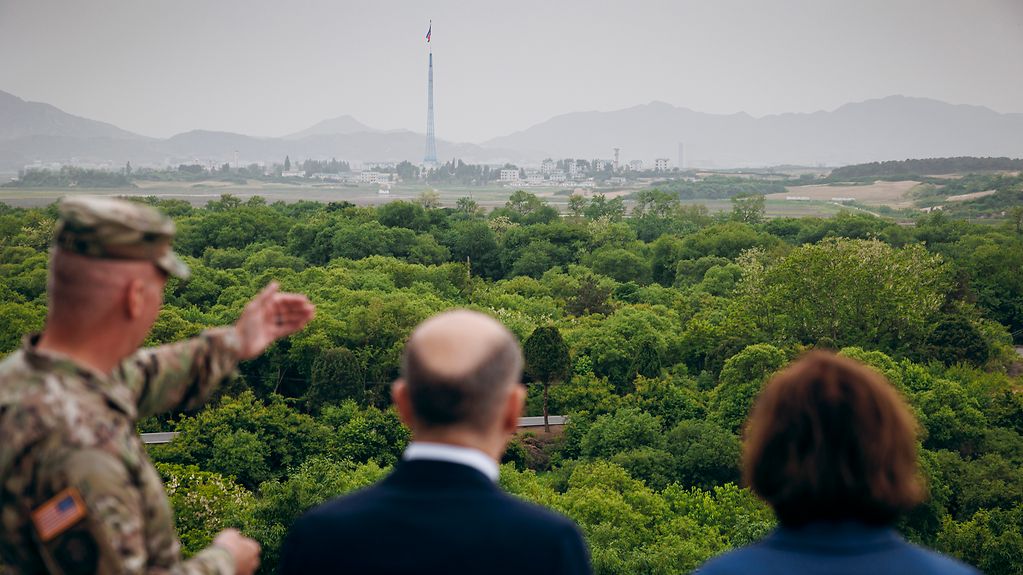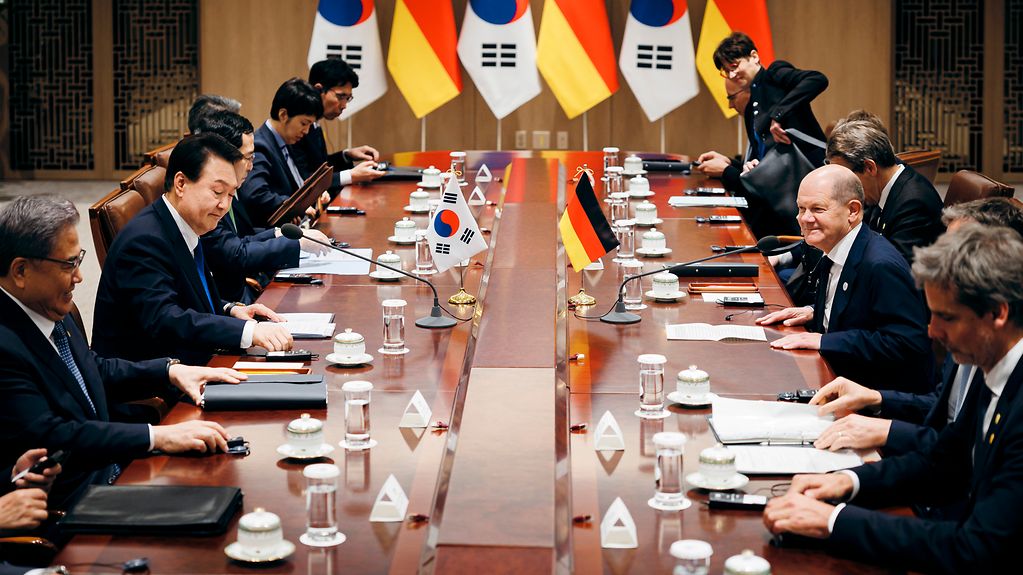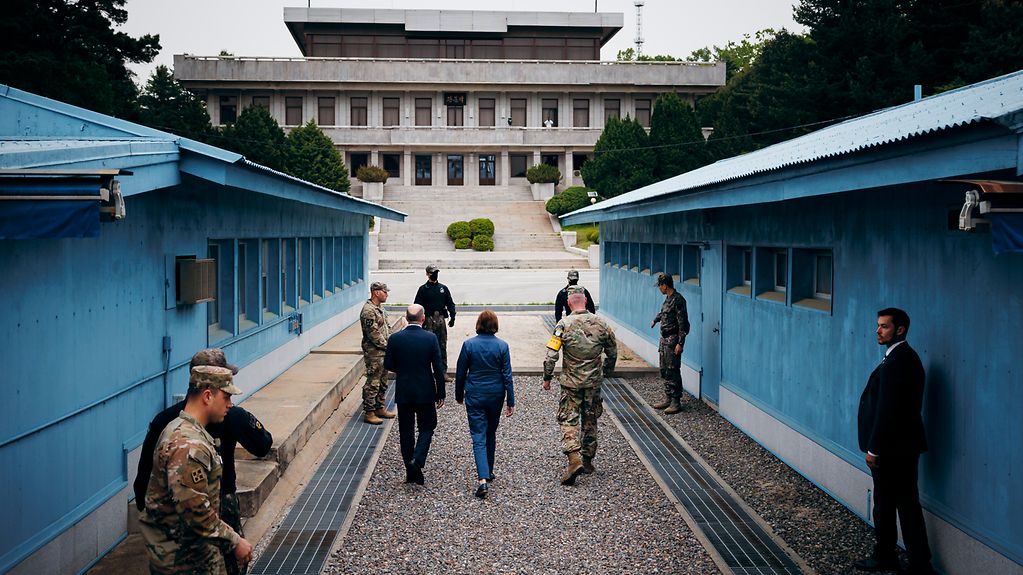The Federal Chancellor in Korea
North Korea must halt its ballistic tests said Federal Chancellor Scholz during a visit to the border between North and South Korea after which he met with President Yoon in Seoul. Scholz expressed his appreciation for the recent closer cooperation with our partners in the Indo-Pacific region, which he said were "in the interest of peace and security throughout the entire region".

An officer of the Ceasefire Commission helps the Federal Chancellor to understand the view across the demilitarised zone towards North Korea.
Photo: Federal Government/Zahn
The political friendship between Germany and Korea goes back a long way – this year the two countries are celebrating the 140th anniversary of their bilateral relations. "This is evidence of a high degree of mutual understanding," said the Federal Chancellor following his meeting with South Korean President Suk-Yeol Yoon in Seoul.
Today's trip was the first time since 2010 that a Federal Chancellor has visited the Republic of Korea; the last to do so was ex Federal Chancellor Merkel, who accepted an invitation to attend the G20 summit in Seoul in 2010. The last Federal Chancellor to visit the country before that was Helmut Kohl in 1993.
Economic and climate related cooperation
Referring to the challenges posed by climate change, Scholz stated that Germany and the Republic of Korea wanted to cooperate even more closely to achieve climate neutrality. The Green Climate Fund, to which Germany has pledged two billion dollars of support is headquartered in South Korea.
Yet, he said, nobody wanted to create new barriers to trade through climate protection measures, which "is why a while ago I came up with the idea of an open, international, and inclusive climate club, whose members all agree on common standards and regulations." Scholz expressed his pleasure about the fact "that the Republic of Korea also wants to enrol as a member of the Climate Club".

Federal Chancellor Scholz is the first German head of government to travel to the Republic of Korea for a government summit since 1993.
Photo: Federal Government/Zahn
Click here to hear the statement Federal Chancellor Scholz made at the joint press conference with President Suk-Yeol Yoon.
Scholz also explained that Germany and Korea were planning on working more closely in future to develop a more resilient economy and improve security, particularly with regard to global supply chains.
The Republic of Korea is a member of the G20, which means it has one of the world’s strongest economies. South Korea was also invited to attend this year’s G7 summit in Hiroshima.
A shared experience of national division
Reflecting upon his visit to the demilitarised border zone between North and South Korea, the Federal Chancellor drew attention to the historical parallels of national division, which the two countries share – "the brutal experience of national partition", as he put it. His visit, he said, had moved him profoundly: "whilst we Germans were fortunately able to overcome the division over 30 years ago, the split is still a bitter, daily reality for our Korean friends.”
The Federal Chancellor had visited the so-called demilitarised zone – a four-kilometre-wide strip of land that roughly follows the 38th parallel – before meeting with the South Korean President.

Federal Chancellor Scholz was very moved by his visit to the demilitarised zone between North and South Korea, which, he said, symbolises the ongoing danger of the situation.
Photo: Federal Government/Zahn
Click here to read the statement the Federal Chancellor made during his visit to the demilitarised zone.
The Republic of Korea is facing an imminent threat due to North Korea's illegal weapons programmes: "Not only do the North Korean ballistic missile tests violate international law," said the Federal Chancellor, "but they also represent a severe source of stress for the citizens of Korea, Japan, and the entire region and Germany strongly condemns this irresponsible course of action."
The German government, he said, supports South Korea's efforts to persuade North Korea to end the development of weapons of mass destruction and ballistic missile programmes completely, irreversibly, and demonstrably: "Mr President, we stand in complete solidarity with you and your countrymen," the Federal Chancellor said.
South and North Korea have been divided since the Korean War (1950-1953). Based on their shared experiences of partition, political and academic experts have been meeting in the German-Korean Consultation Committee every year since 2011 to discuss specific questions relating to reunification and to put forward suggestions for the intra-Korean rapprochement process.
Cooperation for peace and security
Scholz praised the Korean President's initiative to address historically sensitive issues concerning the Korean-Japanese relationship: “Initiatives such as this,” he said, “require political courage and wise farsightedness, both of which you show. Thank you for that!" Germany, the Federal Chancellor said, was looking forward to closer cooperation with its partners in the Indo-Pacific area in the interest of peace and security throughout the region.
Referring to the Russian offensive in Ukraine, Scholz reiterated the importance of keeping up the pressure against Russia by continuing with the sanctions, whilst also doing everything possible to ameliorate negative effects on third countries.
The Federal Chancellor underlined the high degree to which the two countries found themselves in agreement and stressed the fact that: "as democracies and partners with shared values, Germany and Korea stand united in favour of a rules-based international order."
Germany is South Korea’s most important European trading partner: the bilateral trade volume in 2022 was around 34.6 billion euros and 100,000 workers in Korea are currently employed by about 500 German companies. After China and Japan. Korea is Germany’s third most important trading partner in Asia.
Read Federal Chancellor Scholz's interview with "Yohap News Agency” here (only German).